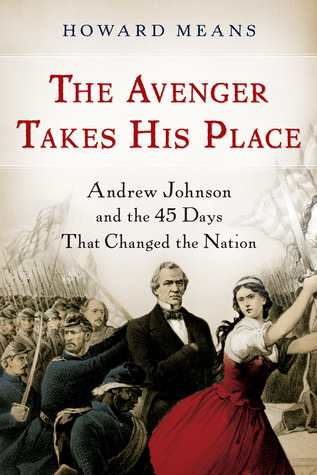Tags
American history, Andrew Johnson, biographies, book reviews, Howard Means, presidential biographies, Presidents
 “The Avenger Takes His Place: Andrew Johnson and the 45 Days That Changed the Nation” by Howard Means was published in 2006. Means is a former writer and editor for Washingtonian magazine, an editorial board member at the Orlando Sentinel and op-ed columnist. He has also written several books including a biography of Colin Powell.
“The Avenger Takes His Place: Andrew Johnson and the 45 Days That Changed the Nation” by Howard Means was published in 2006. Means is a former writer and editor for Washingtonian magazine, an editorial board member at the Orlando Sentinel and op-ed columnist. He has also written several books including a biography of Colin Powell.
Perhaps evident from its title, Mean’s book is less a comprehensive biography of Andrew Johnson and more an examination of the weeks following Lincoln’s assassination and Johnson’s ascension to the presidency. But lest the reader take the inference too far, while this book does not provide a systematic exploration of Johnson’s full life neither does it focus primarily on the first forty-five days of Johnson’s presidency.
In fact, although Means is an articulate and interesting writer, the most frustrating aspect of this book is its organizational structure. It is neither a biography nor a treatise on Johnson’s earliest days in the White House. Although it promises forty-five days “that changed the nation” is does not deliver on this promise.
What the book does deliver is an often circuitous but frequently interesting brainstorm on much – but not all – of Johnson’s life, Lincoln’s assassination, the heated debates over post-Civil War Reconstruction and the personality traits which ultimately led to Johnson’s failure as president of a deeply divided nation.
For reasons that are not clear the book insists on meandering chronologically, jumping back and forth between different decades in order to prove one point or another. The author also frequently focuses too much attention to matters that later prove to be distractions. As a result it can be easy to lose track of the central storyline, and Johnson himself often disappears into the background.
To its credit, however, the book offers important background on Johnson’s extraordinary early life: his rise from abject poverty with no education whatsoever to wandering but skilled tailor to remarkably successful politician. But it is too brief to fully capture the man’s persona. In addition, while Means does not see his goal as correcting Johnson’s reputation as one of our least successful presidents, he does an excellent job of putting Johnson’s many strengths – and flaws – into context.
In addition, the book’s preface and epilogue were excellent. Both were potent, insightful and punchy. Unfortunately, the preface led me to expect an even more impressive book than the author was able to deliver, but the concluding chapter rewarded me for my perseverance.
In the end, this is an often interesting book which is accessible to a general audience. Unfortunately, its most potent messages are diluted by the book’s structure and flow. For those who can see through the distractions this book offers compelling lessons on Johnson as president (and as a person) and provides some acutely interesting observations on the era. But as a first book on Andrew Johnson, or as a comprehensive biography of a failed president, it is far from ideal.
Overall rating: 3½ stars

The best book about Johnson and his presidency is Eric McKitrick’s 1960 volume “Andrew Johnson and Reconstruction.” It’s a scholarly rather than popular work, but it revolutionized Reconstruction scholarship and does a masterful job of relating what COULD have happened — what did NOT happen — and what DID happen (tragically). It’s 500 pages of well-written but academic prose, so not for the faint of heart — but very well done.
My question: I would have thought from your first two reviews that you preferred the Trefousse bio over Means, but you gave them both 3-1/2 stars. Do you really see them as equal in quality? No preference for one over the other?
My wife asked exactly the same question. I thought Means’s book was more entertaining and interesting, and had some particularly insightful observations but was poorly structured and somewhat less “scholarly” than Trefousse’s. I thought the latter was more dry and academic (and less exciting to read) but more rigorous and thorough.
On balance, I believe Trefousse’s is the better book for someone looking for a “biography” of Johnson but when considering everything, including the ability to enjoy the reading experience, I found them about equal.
Thanks for your suggestion on McKitrick. I saw reference to this yesterday (I believe in the acknowledgements of one of my existing Johnson bios) and have added it to my list of follow-up items. Sounds dry but thorough. I’m in!
[Update: It has been ordered and should be here by the time I finish my third Johnson biography, so I’ll include it in this round of reading!]